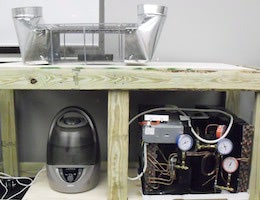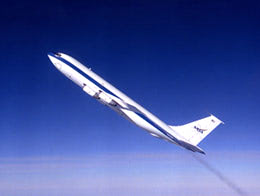- Undergraduate
Bachelor's Degrees
Bachelor of ArtsBachelor of EngineeringDual-Degree ProgramUndergraduate AdmissionsUndergraduate Experience
- Graduate
Graduate Experience
- Research
- Entrepreneurship
- Community
- About
-
Search
All Thayer News
Dartmouth Engineering Students Selected for NASA's Zero-Gravity Research Program
Mar 04, 2011
CONTACT: Catharine Lamm
1-603-646-3943
A team of Dartmouth engineering students was recently selected to participate in NASA's 2011 Microgravity University which offers a Reduced Gravity Student Flight Opportunities Program. This NASA program enables undergraduate students to "propose, design, fabricate, fly and evaluate a reduced gravity experiment of their choice." The experience includes "scientific research, hands-on experimental design, test operations and educational/public outreach activities."

Prototype of the team's condensing heat exchanger for spacecraft
The selected team of four students—Sean Currey '11, Broghan Cully '11, and BE program candidates Maxwell Fagin and Michael Kellar—is working on a project sponsored by NASA's Glenn Research Center. The goal is to design a condensing heat exchanger (essentially a dehumidifier) that uses porous graphite to extract moisture from the spacecraft's cabin. If successful, such a system could replace the Common Cabin Air Assembly currently in use on the Space Shuttle and International Space Station, which is bulky and not optimized for long-duration spaceflight.
Between June 2–11, the students will perform related experiments aboard a reduced gravity aircraft as it flies 30 parabolic maneuvers over the Gulf of Mexico. Passengers experience approximately 30 seconds of hypergravity (1.8G–2G) as the plane climbs followed by approximately 25 seconds of microgravity (0G) as the plane descends. (At the very top and bottom of the parabola, flyers experience a mix of partial G's between 0 and 1.8)

NASA's KC-135A aircraft ascends at a steep angle as it flies over the Gulf of Mexico (photo courtesy of NASA)
The project is for Dartmouth's two-term capstone course sequence, Engineering Design Methodology. The team's advisor is Professor Doug Van Citters, and joining them for the test flight will be two additional engineering students: Julianna Scheiman '11 and Dual Degree Program student William Voigt.
The students make up one of only 14 teams selected for this year's program.
For contacts and other media information visit our Media Resources page.
